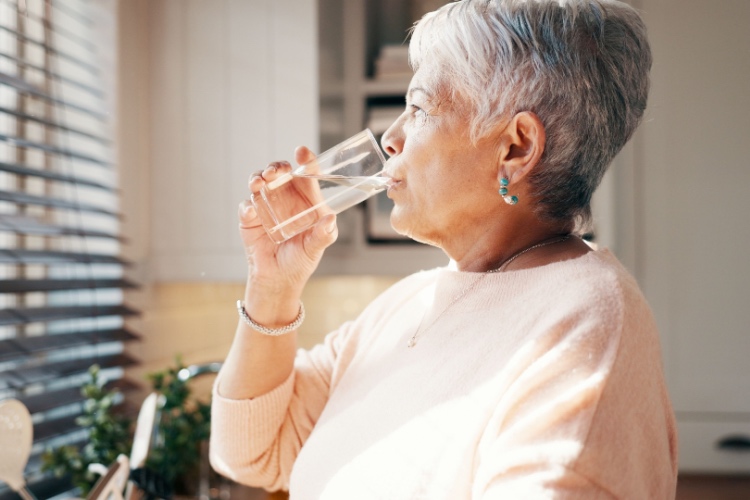As we get older, our body’s ability to regulate fluids changes. Thirst cues may not be as strong, medications can influence hydration levels, and physical limitations might make it harder to get fluids throughout the day. Staying hydrated is one of the simplest ways to support overall well-being, but many seniors are unintentionally at risk of dehydration.
Table of Contents
- Why Hydration Matters More With Age
- 1. Make Water More Appealing
- 2. Eat Foods With High Water Content
- 3. Use Reminders and Daily Routines
- 4. Keep a Water Bottle Within Reach
- 5. Understand Medication Side Effects
- Small Signs Dehydration May Be Sneaking In
- How Staying Hydrated Supports Your Mind and Mood
- Support That Considers the Whole Picture
- Frequently Asked Questions
Why Hydration Matters More With Age
Water plays a role in nearly every function of the human body. It supports circulation, digestion, joint health, temperature regulation, and even mood. As we age, our total body water naturally decreases, which makes it easier to become dehydrated. Seniors are also more likely to have health conditions or medications that increase water loss, such as diuretics for blood pressure, or laxatives for digestion. Studies show that people aged 65 or older don’t drink enough liquids.
Dehydration in older adults can lead to confusion, fatigue, dizziness, low blood pressure, or even hospitalizations if left unaddressed. But the good news is that many of these risks can be minimized with consistent, daily attention to fluid intake.
1. Make Water More Appealing
For many older adults, one of the biggest barriers to staying hydrated is simply not enjoying plain water. Taste preferences can shift with age, and some people may find water bland or unappealing, especially if their sense of taste or smell has changed over time. Others may avoid drinking because they don’t want to make frequent trips to the bathroom. But staying hydrated doesn’t mean drinking glass after glass of unflavored water. The key is to find enjoyable, low-effort ways to incorporate more fluids into daily life. Here are some practical ideas:
Add natural flavors:
Infuse water with slices of fresh fruit like lemon, orange, berries, or cucumber. Fresh herbs such as mint, basil, or rosemary can also add subtle but refreshing flavor. These options are especially helpful for those who are trying to cut back on sugar or artificial ingredients.
Try different temperatures:
Some people prefer cold water with ice, while others find that room temperature or warm water is easier to sip slowly throughout the day.
Use herbal or decaf teas:
Herbal teas, served hot or iced, are a great alternative to plain water. Chamomile, ginger, and hibiscus teas not only help with hydration but may also offer added benefits like relaxation or digestive support.
Consider low-sugar flavored waters or electrolyte drinks:
For those who need variety, occasional use of flavored water with low or zero calories or diluted electrolyte powders (with low or no sugar) can help increase fluid intake.
Use appealing drinkware:
A favorite cup or reusable water bottle, especially one with a straw or spout, can actually encourage more sipping throughout the day. Small details like grip-friendly designs or spill-proof lids can make the process more comfortable and safe.
2. Eat Foods With High Water Content
Drinking water isn’t the only way to stay hydrated. In fact, many everyday foods contain a significant amount of water—and for older adults who may struggle to drink enough fluids throughout the day, these foods can be a valuable part of a hydration strategy.
Fruits and vegetables are particularly effective. Many of them are made up of 80–95% water, which means they contribute meaningfully to daily fluid intake while also offering essential vitamins, minerals, and fiber. For those with lower appetites or chronic health conditions, these water-rich foods can also be gentler on digestion and easier to eat than heavier meals.
Some of the best options include:
- Fruits: Watermelon, cantaloupe, strawberries, oranges, pineapple, grapes, and peaches
- Vegetables: Cucumbers, lettuce, celery, zucchini, tomatoes, and bell peppers
- Other hydrating foods: Yogurt, cottage cheese, applesauce, gelatin, and low sodium broths or soups
3. Use Reminders and Daily Routines
One of the biggest challenges with hydration is remembering to drink before you feel thirsty. That’s especially true for older adults whose thirst response may be weaker.
Routines and visual cues help:
- Pair drinking water with daily habits like taking medication, brushing teeth, or reading the morning paper.
- Set alarms on a phone, watch, or clock to prompt sips throughout the day.
- Use sticky notes on the fridge or bathroom mirror as visual hydration reminders.
There’s no need to drink a full glass each time. Smaller, more frequent sips can be easier to manage and often more effective.
4. Keep a Water Bottle Within Reach
Having water nearby makes it easier to stay hydrated, especially for older adults who may find it tiring or uncomfortable to get up frequently. When water is within reach, on a bedside table, next to a favorite chair, or on the kitchen counter, it becomes part of the routine without requiring extra effort.
The type of container matters, too. Lightweight bottles, cups with handles, or ones with built-in straws can be easier to grip and use, particularly for those with arthritis or limited strength. Spill-proof lids add peace of mind, and insulated options can keep water at a preferred temperature longer.
These small adjustments help turn hydration into a steady habit. When it’s easy to sip throughout the day, it reduces the risk of dehydration and supports better energy, focus, and overall comfort.
5. Understand Medication Side Effects
Certain medications commonly prescribed to older adults can increase the risk of dehydration. Diuretics, blood pressure medications, and some antidepressants may lead to more fluid loss or reduce the body’s ability to signal thirst. Others, like antihistamines, can cause dry mouth, which makes drinking regularly even more important.
It’s a good idea to review medications with a doctor or pharmacist to understand how they might affect hydration. Being aware of these side effects allows for small adjustments, like drinking more often throughout the day or timing fluids around medication schedules.
Paying attention to how medications affect the body helps prevent common issues like fatigue, dizziness, or confusion, all of which can stem from even mild dehydration.
Small Signs Dehydration May Be Sneaking In
Dehydration doesn’t always show up as extreme thirst. And according to the American Heart Association, the amount of water a person should drink can vary.
Here are a few signs to watch for if you are not drinking enough water:
- Feeling lightheaded when standing up
- Dry mouth or chapped lips
- Less frequent urination or darker urine
- Headaches or mild confusion
- Ongoing fatigue without a clear cause
- Less frequent urination—or urine that’s darker than pale yellow
Urine color can be one of the easiest clues. Ideally, it should be light yellow. Darker shades may be a sign that your body needs more fluids, especially if it happens consistently.
These signs may come on slowly, especially in warm weather or during illness. Staying alert to these changes can help catch and address dehydration early.
How Staying Hydrated Supports Your Mind and Mood
Hydration doesn’t just affect the body, it also plays a key role in how we think and feel. Even mild dehydration can influence mood, memory, and focus, especially in older adults. It can make everyday tasks feel harder, increase irritability, and contribute to feelings of fatigue or fogginess.
For some, low fluid levels can cause or worsen symptoms that may look like depression or confusion. In fact, when a senior feels off or unusually forgetful, dehydration is sometimes a contributing factor that goes unnoticed. This can be particularly important for those already dealing with conditions like dementia or anxiety, where mental clarity and emotional balance are already sensitive.
Keeping up with hydration helps support better concentration, steadier energy, and a more even emotional state. While water alone isn’t a cure for emotional or cognitive concerns, it’s a foundational habit that helps everything else work a little more smoothly. It’s a small, consistent way to support mental well-being. One sip at a time.
Support That Considers the Whole Picture
Getting older comes with all kinds of changes, some expected, some not. It’s not always easy to adjust, and sometimes it helps just to have someone in your corner. At Blue Moon Senior Counseling, we’re here to offer that extra support, whether it’s working through tough emotions, finding ways to feel more connected, or simply having a safe space to talk things out.
We work with older adults navigating everything from stress and anxiety to grief to major life transitions. Whatever you’re facing, you don’t have to figure it out alone. Our licensed therapists take the time to understand your unique experiences and help you find tools that make daily life a little lighter.
Call us today at 630-896-7160 or fill out our contact form here.
Frequently Asked Questions
- How much water should an older adult drink each day?
Most older adults should aim for 6 to 8 cups of fluids daily, but this can vary depending on medications, medical conditions, and activity levels. Talk to a doctor for individual guidance.
- What drinks besides water are good for hydration?
Herbal teas, low-sugar electrolyte drinks, milk, and flavored water are all good options. Avoid drinks high in caffeine, sugar, or alcohol when trying to stay hydrated.
- How do I know if I’m drinking enough water?
Check urine color (it should be light yellow), pay attention to how often you’re urinating, and watch for symptoms like dizziness, fatigue, or dry mouth.
- Can dehydration affect memory or thinking?
Yes. Dehydration can lead to confusion, trouble focusing, and short-term memory issues. Staying hydrated can help maintain cognitive function.
- What if my loved one doesn’t like water?
Try flavoring water naturally, offering fruits with high water content, or giving small sips throughout the day. It’s better to take in small amounts regularly than to try and drink large amounts all at once.











